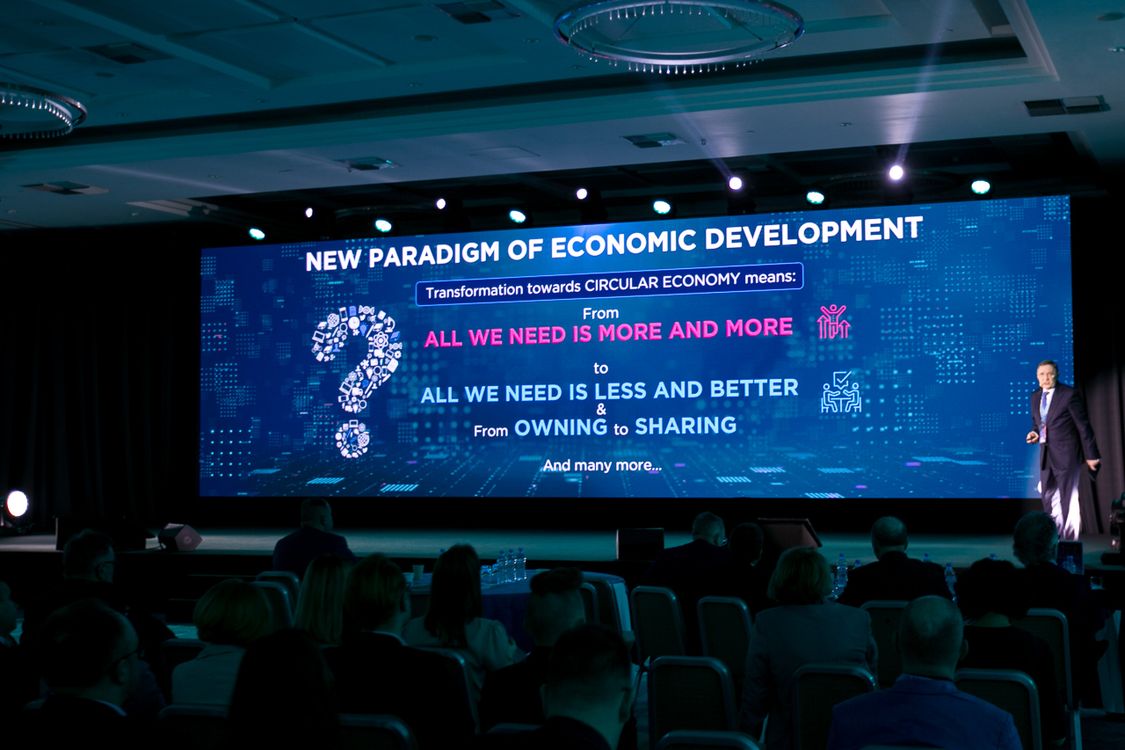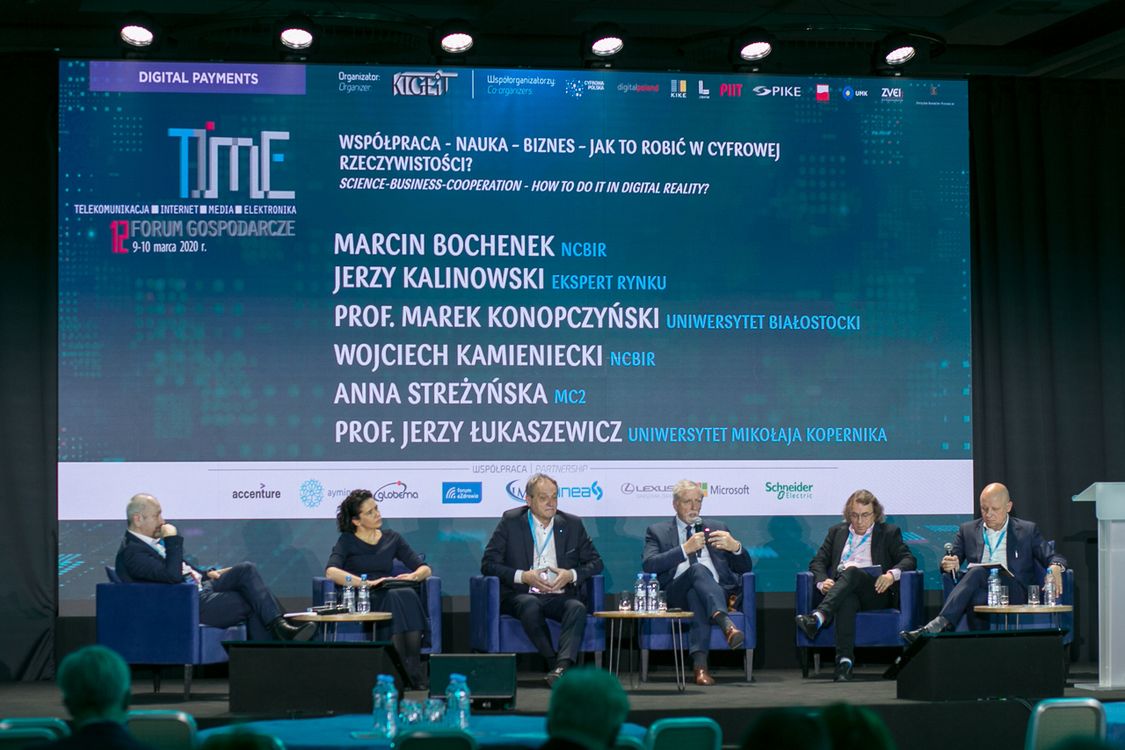Between competition and cooperation: the new digital world
Summary and conclusions
 The discussions at this year’s forum focused around two topics: European Green Deal and COVID-19. During all conference panels it was emphasized that digital technologies are effective and available tools that should be used to support economic transformation and solving impending crises affecting climate and environment as well as pandemics yet to come. It was stressed that the main issues we currently face are of global character and require closer cooperation in all domains of social and economic life.
The discussions at this year’s forum focused around two topics: European Green Deal and COVID-19. During all conference panels it was emphasized that digital technologies are effective and available tools that should be used to support economic transformation and solving impending crises affecting climate and environment as well as pandemics yet to come. It was stressed that the main issues we currently face are of global character and require closer cooperation in all domains of social and economic life.
Universal digitization brought a radical increase in technological productivity in all areas. Unfortunately, this did not led to an actual increase in productivity, since it would require the creation of an adequate global system of digital network cooperation. Numerous presentations emphasized that the EU may be a market that could stimulate global productivity growth based on ecologically sustainable technologies, provided that the EU legal system would reward investments in such technologies. The EU market must therefore be open to cooperation in terms of:
- construction of interoperable IT systems – databases, information and knowledge – necessary for the implementation of circular economic systems;
- harmonization of standards providing for interoperability, accessibility and adaptation of I 4.0 industrial networks to the needs of the SME sector;
- ensuring conditions for European consolidation of telecommunications networks on a scale tailored to the needs of industry, infrastructure and universal services;
- improving the innovation environment, which must rely on easy access to information, simplified procedures and facilitated conditions for applying for aid;
- activation of enterprises in terms of innovation within industrial networks and lifelong learning based on I 4.0 platforms supported by EU countries;
- establishing uniform curriculum along an adult education system – rewarding innovative attitudes and building civic culture relying on the need for lifelong learning.
The participants were in favour of:
- the idea of transforming the EU single market that favours environmentally and climate neutral technologies by 2050;
- completion of works on the legal framework of the green network economy by the end of 2021;
- comprehensive digitization of the financial system;
- full transition to the system supplying the economy with energy from renewable sources and energy storage facilities throughout the EU;
- acceleration of investments in 5G networks forming the basis of infrastructural network economy;
- digitization of healthcare and the healthcare system with the use of networks and software in the area of prevention, health monitoring, diagnostics and clinical management;
- creation of digital twins and digital images of all material and virtual resources that are the subject of the EU economy;
- construction and ongoing modernization of digital twins of EU ecological systems,
- digital integration of EU technical infrastructure.
Quantitative and qualitative targets for Europe should be set in each of the areas listed above
Plenary sessions
During the Forum, simultaneous discussions were held on policies related to:
- development of Industry 4.0;
- investments in 5G telecom networks;
- digitization of financial systems.
A significant value was brought by expert discussions, recorded and shared on the TIME EC’s website (http://12.fgtime.pl). Please refer to source materials for more details. In this summary, we would like to focus on the topics that dominated the majority of sessions, which proved their horizontal nature. These topics included:
- digitization of products, services, systems, infrastructure and business processes to the extent that will allow launching services with critical requirements (e-Health, e-mobility, production, security),
- commercialization of key consumer technologies:
- VR, digital twins and images,
- artificial intelligence,
- blockchain;
- supporting innovation of the EU economy by modernizing and digitizing education and lifelong learning systems;
- building an EU legal system tailored to the reality of a network economy based on the principles of coopetition (i.e. balanced combination of cooperation and competition between independent entities).

Digital technologies and financial platforms
The discussions concerned digitization aimed at increasing mobility, improving banking systems and payments. For example, in Poland, 18 million users of electronic banking and over 13 million users of mobile payments are a living proof that digitization is the technological cornerstone of the EU financial market. 4 years ago, the EU was still one of the most innovative markets in the world. Recently, however, it has slowed down. We were unable to enter international markets and, consequently, unable to take part in the development of technologies that reveal their effectiveness at a larger scale.
In UE, around 1 million people work on the development of software for financial markets, and in the next 5 years this number will double. Without support for strengthening cooperation under European development projects of a functional nature, the entire EU is threatened by further loss of leading position we had 5 years ago. The main problem is overregulation at EU and national levels, which hamper the use of new technologies and economies of scale, and thus inhibit all innovation in the financial sector. Particular emphasis should be placed on the implementation of technology based on AI, Voice Banking and biometrics. 5G networks and achievements in terms of blockchain are a strong foundation for the financial systems of the coming decade. Further development of cryptocurrencies and blockchain technology is needed due to their compatibility with the network economy. The awareness of this fact is already so widespread that the stage of normalization and standardization of the cryptocurrency market and blockchain technology has already begun.
Artificial intelligence
The need to launch a large number of scientific, research and implementation projects along with further commercialization is the only way to disseminate theoretical and practical knowledge about AI applications. This thesis was supported in most plenary sessions on industry, telecommunications and services (including medical, educational and financial services). AI technology is likely to pinpoint most network innovations in the coming decade. At the same time, however, we must remember that we are at the very beginning of a very long process. The demand side is interested in the final product, not the technical way of its implementation, so the development programming cannot depend on it.
Normalization and standardization
In many cases, the discussion on normalization and standardization was much deeper and more extensive than expected. The following ideas emerged the most frequently:
- application of industry 4.0 in the SME segment means the need to create an environment of harmonized standards supported by an appropriate legal ecosystem that will ensure a minimum level of investment, technological and digital security,
- creating norms and standards should be treated as technology transfer and may be covered by public support for this type of activity, provided that the know-how included in the standard does not oblige the entity using this standard to purchase additional copyrights,
- despite the fact that standardization and normalization will have a much greater significance than before, they should not at any time be used to create non-tariff barriers or other instruments of a similar nature, since it may limit innovation,
- norms and standards can serve as tools for placing on the market products or services harmful to the environment and climate, unless have technology and production potential in the EU that will allow avoiding the type of harmfulness demonstrated,
- normalization of rules for the use of materials and technologies that affect the environment should be based on the analysis of technologies in the full marketing cycle, i.e. throughout the entire life cycle of resources in the sense of circular economy,
- pro-ecological and pro-network overregulation goes against innovation and thus may have the opposite effect to the intended one.
Innovation
Cooperation between science and business requires a better mutual understanding. The scientific community must understand that today’s world is based on innovation. Business should recognize the scientific, research and innovation potential of higher education facilities. Even today, such tools as budget assistant or an innovation assistant introduced by the R&D support agencies (in Poland it was the National Centre for Research and Development), enabling applicants to verify their ideas and financial assumptions, are a true embodiment of this idea. This is to be achieved through the proposal of building a system based on the one-stop principle, to which an applicant seeking funds to support their project would be guided. Innovations are not only technical or chronological changes, they have also social character.
Detailed recommendations
During the meeting, a number of valuable detailed expert recommendations were submitted, which will be used by Forum organizers during legislative works on I4.0 and circular economy.


